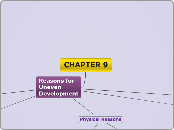Colonialism is the domination of a more powerful country over another country
CHAPTER 9
Reasons for Uneven Development
Historical Reason
Colonialism
Many of today's less developed countries are former colonies while most of the developed contries today were colonial powers
Political Reasons
Leadership
In general, countries with leadership that is efficient and development-oriented develop faster than countries that is corrupt and unstable
Political Conflict
In general, countries enjoying peace and political stability develop faster than countries experiencing wars or political instability
Social Reasons
Population Growth Rate
In general,countries with low population growth rates develop faster than countries with high population growth rates.
Rapid Population increase -> over popultation -> insufficient resources ->not able to meet basic needs of people
Education
In general,countries with high literacy rates develop faster than countries with low literacy rates.
compulsary education -> educated workforce ->job opportunities -> increase standard of living
no compulsary education -> limited access to schools -> poorly educated workforce -> slow development
Economic Reason
Cumulative Causation
The Core countries tend to develop at the expense of the periphery countries as they attract workers and resources from the periphery countries (backwash effect). Overtime,however,the benefits gained from the development of the core will spread to the periphery (spread effect)
Physical Reasons
Climate
In the late 1800s, it was believed that countries with a mild climate tended to develop faster than countries with a harsh climate as it provided an advantage in the develepment of certain sectors such as agriculture. This theory has been widely criticised beacuse people have learnt that technology and good development strategies can help to overcome the limitations of climate on development.
Presence of Raw Materials
In general,countries with plenty of natural resources develop faster than countries with few or no natural resources
HOWEVER!
Countries endowed with raw materials does not guarantee high development level. The money earned from selling raw materials is reinvested into the raw material exporting industries as well as to develop urban areas leaving the rurals to be undeveloped.









